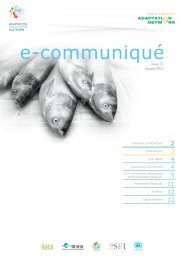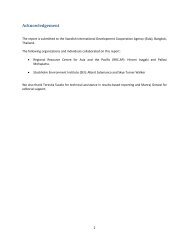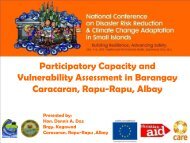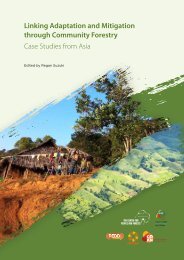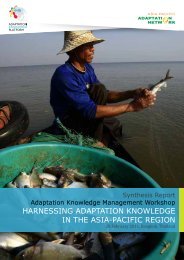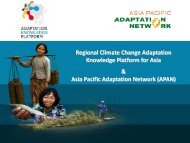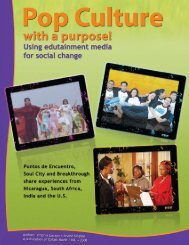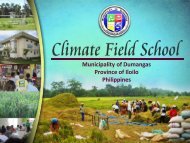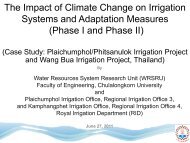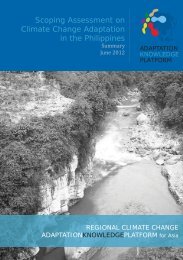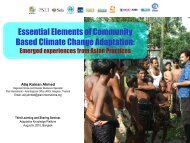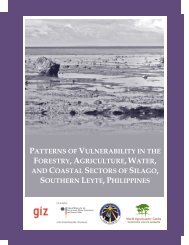Desktop Study on - Regional Climate Change Adaptation ...
Desktop Study on - Regional Climate Change Adaptation ...
Desktop Study on - Regional Climate Change Adaptation ...
Create successful ePaper yourself
Turn your PDF publications into a flip-book with our unique Google optimized e-Paper software.
<str<strong>on</strong>g>Desktop</str<strong>on</strong>g> <str<strong>on</strong>g>Study</str<strong>on</strong>g><br />
research activities organised at the nati<strong>on</strong>al level<br />
(Solar, 2009).<br />
Instituti<strong>on</strong>al resp<strong>on</strong>ses<br />
Approximately 38% of all the adaptati<strong>on</strong> activities<br />
proposed in the NAPA are related to the agricultural<br />
sector, focusing <strong>on</strong> enhancement of household-level<br />
integrated farming to improve farmers’ income and<br />
food security, development of rice intensificati<strong>on</strong><br />
system to reduce vulnerability to rainfall variability,<br />
and the development and improvement of<br />
community-level irrigati<strong>on</strong> systems to mitigate the<br />
effects of drought, specifically in the Tônlé Sap and<br />
al<strong>on</strong>g the major Mek<strong>on</strong>g floodplains (Roth, 2009,<br />
Solar, 2009). Rehabilitati<strong>on</strong> of coastal infrastructure<br />
is also promoted to increase agricultural producti<strong>on</strong><br />
and mitigate erosi<strong>on</strong> in coastal z<strong>on</strong>es.<br />
Gaps Identified in Programmes and<br />
Studies Research Gaps<br />
There has not been much research focused <strong>on</strong> farm<br />
level adaptati<strong>on</strong> in Cambodia, which reflects the<br />
generally weak research capacity (Roth, 2009).<br />
However, there is a potential research linkage<br />
between the Cambodian Agriculture Research<br />
Institute and other institutes, e.g. Internati<strong>on</strong>al<br />
Rice Research Institute (IRRI), which promotes<br />
genetically modified rice varieties with tolerance<br />
to climate variability. The breeding of rice varieties<br />
that are highly tolerant to submergence and drought<br />
is suggested as potential significant c<strong>on</strong>tributi<strong>on</strong><br />
to predominantly practiced rice-based cropping<br />
systems in Cambodia.<br />
Meanwhile, it is said that the research processes,<br />
including the c<strong>on</strong>sultati<strong>on</strong> through operati<strong>on</strong>alisati<strong>on</strong><br />
of research results, does not often entail community<br />
farmers. For example, when analysing research<br />
data and utilising research findings, comm<strong>on</strong> local<br />
language or code of standard, which is not necessarily<br />
a skill required for reading, is not reflected in<br />
relevant materials or c<strong>on</strong>sidered am<strong>on</strong>g agricultural<br />
researchers. Hence this builds a barrier against data<br />
sharing with local users (Solar, 2009).<br />
Enhanced knowledge bases for decisi<strong>on</strong>-making<br />
support are missing. This includes 1) improved<br />
m<strong>on</strong>itoring, 2) enhanced groundwater mapping and<br />
compilati<strong>on</strong> of existing knowledge <strong>on</strong> groundwater<br />
availability and quality, 3) improved availability and<br />
accessibility of data for decisi<strong>on</strong>-making, and 4) a<br />
system for enhancing and expanding management<br />
capacity at the province and commune levels as well<br />
as at the irrigati<strong>on</strong> scheme level (Watt, 2009 cited in<br />
Solar, 2009). This knowledge base would be useful<br />
for irrigati<strong>on</strong> operati<strong>on</strong> that can be maintained and<br />
owned by the government and water user groups<br />
collaboratively.<br />
Governance Gaps<br />
It has been required to establish a comprehensive<br />
instituti<strong>on</strong>al mechanism to strengthen the adaptive<br />
capacities of small scale producers, including the<br />
instruments for tenure security, equitable access<br />
to productive assets and infrastructure, a means<br />
to enhance accessibility and usability of scientific<br />
informati<strong>on</strong> <strong>on</strong> climate patterns at the local level.<br />
In order to accomplish this mechanism, the grey<br />
areas that are not well understood need to be<br />
addressed: for example, how livelihood security<br />
of small-scale farmers may be degraded by what<br />
kind of adaptati<strong>on</strong> resp<strong>on</strong>ses and other social and<br />
envir<strong>on</strong>mental stressors; and which factors and<br />
c<strong>on</strong>diti<strong>on</strong>s undermine the voices of small producers<br />
to be underrepresented and excluded in the nati<strong>on</strong>al<br />
and intermediate-level planning for climate change<br />
adaptati<strong>on</strong> (Pers<strong>on</strong>al Communicati<strong>on</strong>s, MAFF-<br />
Fisheries Administrati<strong>on</strong> cited in Solar, 2009).<br />
It is pointed out that much of rehabilitati<strong>on</strong> work<br />
for improved irrigati<strong>on</strong> system financed by RGC and<br />
d<strong>on</strong>or usually focuses <strong>on</strong> rehabilitating dams and<br />
reservoirs, head works and the main and sec<strong>on</strong>dary<br />
channels, but not <strong>on</strong> the tertiary distributi<strong>on</strong> system<br />
that should be c<strong>on</strong>nected to these main channels<br />
(Roth, 2009). Together with this gap, technical<br />
aspects of rehabilitati<strong>on</strong> work need to be addressed,<br />
including the design of irrigati<strong>on</strong> structures, lack<br />
of drainage management and integrated drainage<br />
systems, effective delivery systems to end-users,<br />
matching irrigati<strong>on</strong> schedules to crop demands for<br />
Cambodian soil and climate c<strong>on</strong>diti<strong>on</strong>s (ibid).<br />
Capacity Gaps<br />
Water user groups have the limited capacity to<br />
operate the irrigati<strong>on</strong> system since they do not<br />
have a str<strong>on</strong>g traditi<strong>on</strong> of irrigati<strong>on</strong> or their social<br />
relati<strong>on</strong>ships have been weakened due to incidents<br />
during the Khmer Rouge period (Roth, 2009).<br />
Recent Projects in the Agriculture<br />
and Food Sector<br />
To follow up <strong>on</strong> the NAPA, <strong>on</strong>e project called<br />
“Promoting <strong>Climate</strong> Resilient Water Management<br />
and Agricultural Practices in Rural Cambodia”, which<br />
relates to both agricultural and water sector, has<br />
been facilitated by UNDP and GEF (Roth, 2009). Built<br />
<strong>on</strong> the NAPA, this project focuses <strong>on</strong> instituti<strong>on</strong>al<br />
capacity building, dem<strong>on</strong>strati<strong>on</strong> of integrated water<br />
resource management and c<strong>on</strong>solidati<strong>on</strong> of best<br />
114



